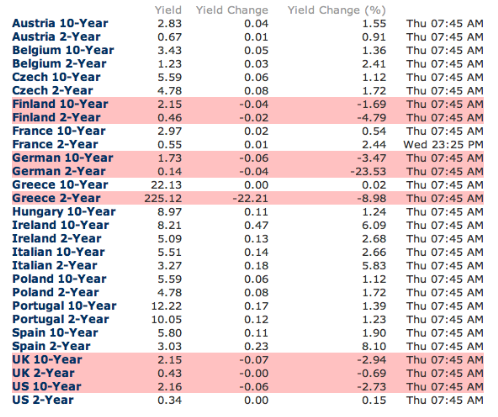Source
“The managing director of the International Monetary Fund made an impassioned plea Tuesday for American leadership in the global economy as she called for the international community to give her organization “more firepower” to bolster tottering economies.
Christine Lagarde told the annual meeting of The Associated Press that last week’s move by eurozone countries to boost their own rescue fund has strengthened her case to ask other large economies to expand the IMF’s financial war chest.
“We certainly need more resources,” she said, without specifying how much more was needed. Lagarde said the IMF would address that question at its spring meeting in two weeks.
The IMF has about $400 billion in resources that it can use to provide loans to countries in trouble. Lagarde has talked about expanding those resources to close to $1 trillion. The 17 countries that use the euro already have promised to provide $200 billion of that amount.
Though the United States is the IMF’s largest shareholder, the Treasury Department has not asked Congress for new IMF funding and will face opposition from Republicans if it does.
Lagarde argues that the IMF’s ability to rescue economies in Europe and elsewhere has a direct bearing on the U.S. economy. She said Europe’s faltering would quickly spread, and the U.S. economic recovery, slowly gaining strength, “might well be in jeopardy.”
“America has a large stake” in how Europe and the rest of the world fares, Lagarde said.
Lagarde said the global economy is making some advances in digging itself out of the worst downturn in decades, but that the recovery remains particularly fragile in Europe. She suggested cutting government spending too quickly in developed countries like the United States and larger European nations could make things worse, not better.
Policymakers on both sides of the Atlantic need “breathing space to finish the job,” she said. As the world’s largest economy, the United States could not shirk its outsized role in the global economy, Lagarde said.
“The world needs U.S. economic leadership,” she said. “Now is not the time to retire, now is not the time to withdraw, now is not the time to phase out. Now is the time to engage.”
Lagarde’s remarks came after the eurozone countries on Friday boosted their emergency bailout funds for heavily indebted countries to $1.1 trillion. That was short of the $1.3 trillion that Lagarde and other international leaders have said is needed to calm financial markets.
Since the Europeans have moved first to raise their firewall, “the time has come to increase our firepower,” she said Tuesday. While short of what the IMF had hoped for, it was a good first step — and something she said the IMF could work with.
Lagarde also suggested that bold steps are needed such as those taken by the Federal Reserve and the European Central Bank to help keep growth strong and steady.
And she said that most countries are running deficits that are too high and “need to bring down debt over time.” And while “some countries under pressure have no choice but to cut deficits today … a global undifferentiated rush to austerity will prove self-defeating. Countries like the United States with low costs of borrowing should not move too quickly.”
Those remarks thrust her into the U.S. presidential debate, where Republicans are united in calling for deep cuts in federal spending, while President Barack Obama — who also addressed the meeting — and congressional Democrats are calling for more job-creating spending, along with raising taxes on the wealthy to help trim budget deficits now exceeding $1 trillion a year.
Asked about Lagarde’s call for the United States to reduce its debt, Obama said: “She’s absolutely right.”
Lagarde noted that more than 200 million people globally, including nearly 13 million in the U.S., are without work, declaring that jobs must be a priority.
Lagarde also said Europe was not yet in the clear and that it was important to continue and expand emergency programs among the 17 countries that use the euro to help heavily indebted countries there.
“We should not delude ourselves into a false sense of security,” she said. “The recovery is still very fragile. The financial system in Europe is still under heavy strain. Debt is still too high, public and private. Stubbornly high unemployment is straining the seams of society. …. Rising oil prices are clearly another cloud on the horizon.”
During a brief question-and-answer period, Lagarde was asked whether some of the more debt-burdened countries would be better off leaving the group.
“As to the size of the eurozone and whether Greece, Portugal and whoever else should or should not be in, you know, it’s a very deeply rooted sentiment that the Europeans, particularly from that area, have that what they have built over the last 50 years or so, right after the second world war, is something that they are very, very attached to.
“And from discussions I’ve had with many leaders, including from the lead countries in the eurozone, I don’t think that there is any political intention, disclosed or hidden, to actually break up that zone,” she said.”
Comments »




